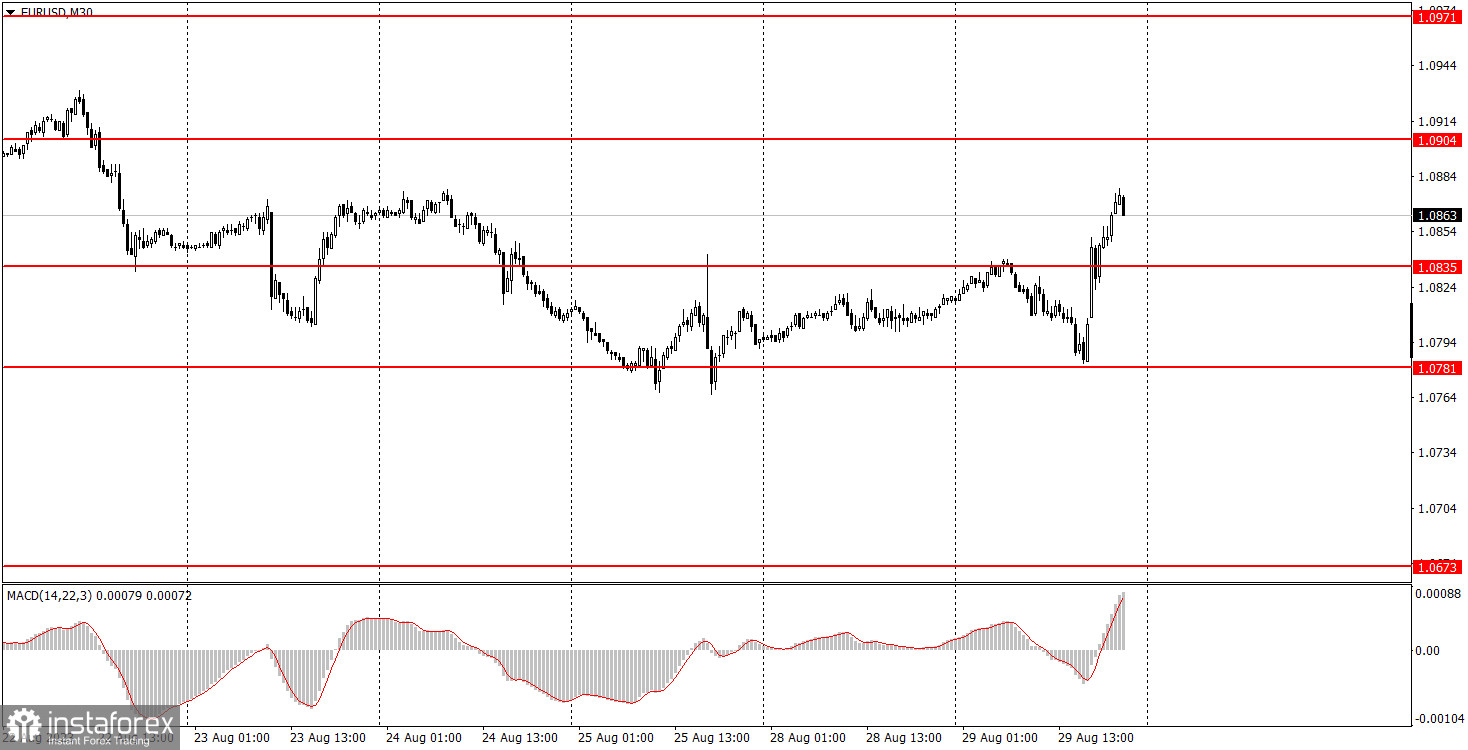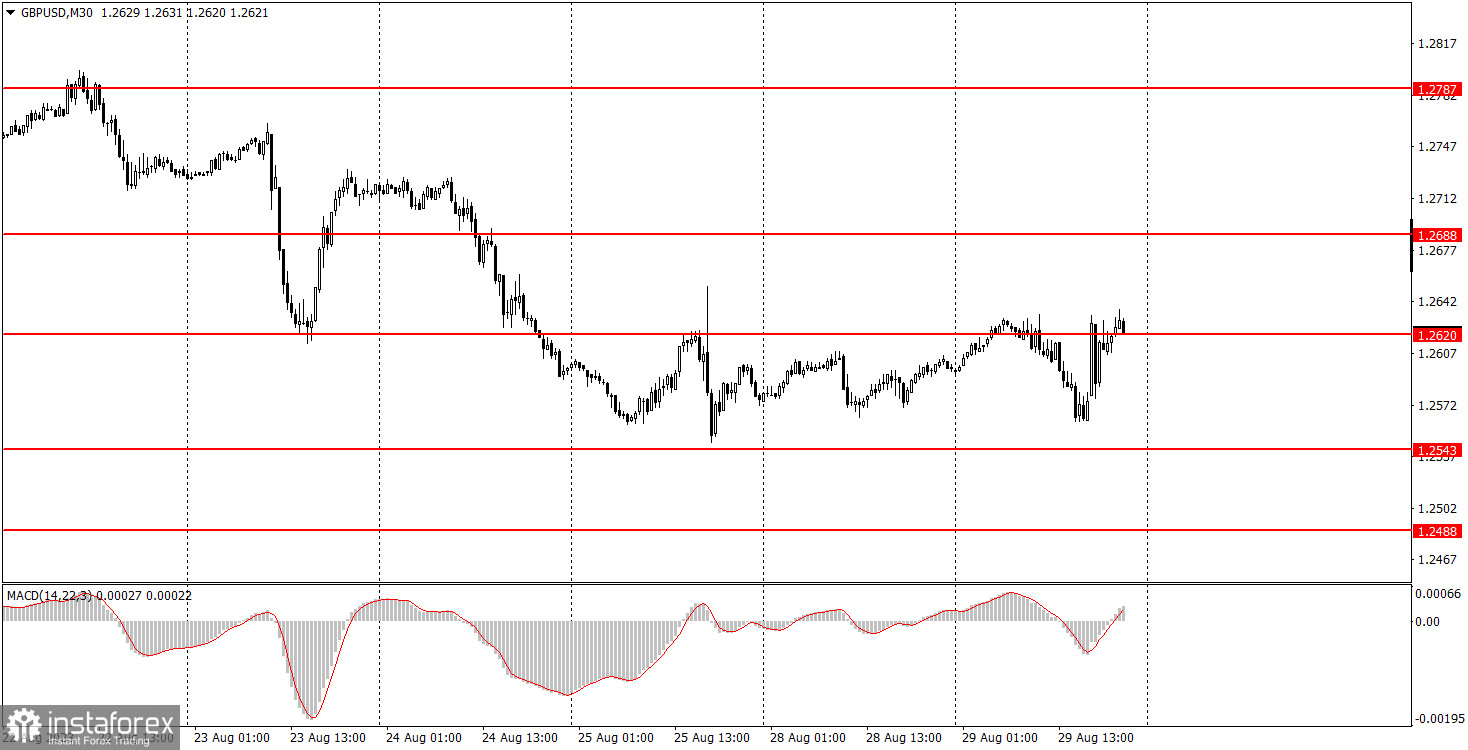Overview of macroeconomic reports:

On Wednesday, several intriguing reports are scheduled for release in the US, EU, and the UK. Germany will release the preliminary value for inflation in August. It's worth noting that August isn't over yet, but the first estimate always has a resonant significance for the market. If we see a deviation from the projected value of 6%, then the report might move the market. Only secondary data will be published in the UK and the European Union, but there are notable events in the US.
The first report will be the Q2 GDP in its second estimate. The second estimate is always the least interesting since it's neither the first nor the final assessment. Hence, regardless of the value, we don't expect a market reaction. Moreover, the report's value is unlikely to deviate from the first estimate or forecast (2.4%). The ADP report on the change in the number of workers in the private sector - an analog of NonFarm Payrolls - will also be released. This report holds less significance than NonFarm Payrolls, but in case of a significant deviation from the forecast (which happens quite often), the market might react.
Overview of fundamental events
There's nothing particular to highlight from Wednesday's fundamental events. No significant speeches will occur throughout the day. From time to time, central bank officials speak, but they rarely share important information, which only has a background influence on market sentiment.
Bottom line
On Wednesday, beginners should focus on German inflation and the US ADP report. Both have a good chance of influencing the movement of currency pairs at the time. It is impossible to predict their actual values, so one should react based on the facts. In general, both currency pairs might continue their correction this week.
Main rules of the trading system:
- The strength of the signal is calculated by the time it took to form the signal (bounce/drop or overcoming the level). The less time it took, the stronger the signal.
- If two or more trades were opened near a certain level due to false signals, all subsequent signals from this level should be ignored.
- In a flat market, any currency pair can generate a lot of false signals or not generate them at all. But in any case, as soon as the first signs of a flat market are detected, it is better to stop trading.
- Trades are opened in the time interval between the beginning of the European session and the middle of the American one when all trades must be closed manually.
- On the 30-minute timeframe, you can trade based on MACD signals only on the condition of good volatility and provided that a trend is confirmed by the trend line or a trend channel.
- If two levels are located too close to each other (from 5 to 15 points), they should be considered as an area of support or resistance.
Comments on charts
Support and resistance levels are levels that serve as targets when opening long or short positions. Take Profit orders can be placed around them.
Red lines are channels or trend lines that display the current trend and show which direction is preferable for trading now.
The MACD (14,22,3) indicator, both histogram and signal line, is an auxiliary indicator that can also be used as a source of signals.
Important speeches and reports (always found in the news calendar) can significantly influence the movement of a currency pair. Therefore, during their release, it is recommended to trade with utmost caution or to exit the market to avoid a sharp price reversal against the previous movement.
Beginners trading in the forex market should remember that not every trade can be profitable. Developing a clear strategy and money management is the key to success in trading over a long period of time.
 English
English 
 Русский
Русский Bahasa Indonesia
Bahasa Indonesia Bahasa Malay
Bahasa Malay ไทย
ไทย Español
Español Deutsch
Deutsch Български
Български Français
Français Tiếng Việt
Tiếng Việt 中文
中文 বাংলা
বাংলা हिन्दी
हिन्दी Čeština
Čeština Українська
Українська Română
Română


